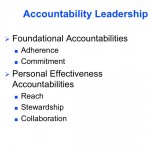Several years ago I started reading the book Accountability Leadership by Gerald Kraines. I was stopped in my tracks in Chapter 1 by what Dr. Kraines said about “The Accountable Organization”. I don’t know whether I ever finished the book because I got busy thinking about and implementing the concept of fixed (or foundational accountabilities) and relative accountabilities. Naturally I adapted them to our organization’s language but the concepts are really from Kraines’ book on page 17. I believe that every organization, serious about a high performance culture, should move to these concepts and include them in their formal performance management system. Here are the basic tenants of my take-away from the book, which I eventually got included in our performance management system and preached often to my organization.
There are two foundational categories of accountability; Adherence and Commitment. A foundational accountability is a minimum requirement or obligation which, if not followed, will destroy trust across the organization. Building trust is fundamental to execution in the high performance culture. Therefore I made “Building Trust” one of our core values and defined it as: to rely on each other, establishing mutual confidence and reliability embodied within and between employees, work groups and departments; and with customers and suppliers.” Therefore employees must be called to account immediately if they are found falling short of achieving Adherence and/or Commitment. These two concepts are defined below.
Adherence: Managers will work within established limits/rules including policies, procedures, contracts, and other managerial guidelines, as well as the law. Managers will adhere and insist on adherence from all employees (including non-reports across the organization).
Commitment: Managers will deliver In-Full-On-Time on all their output commitments and expect the same on all assignments given to direct reports. Under no circumstances will an employee surprise their manager, and no manager will accept surprises in delivery of output commitments. This includes commitments made across the organization to other individuals or departments.
Think about theses two foundational accountabilities. It demands that everyone will follow rules and procedures as cultural norms and that everyone will deliver their commitments on time or will have renegotiated due dates in advance when the unexpected occurs. How different is this culture from your current work culture?
Dr. Kraines included four relative accountabilities in his book; Reach, Fit for purpose, Stewardship, and Teamwork. Adapting these to my way of thinking and our language as an organization, I called them Personal Effectiveness accountabilities and modified them to be the 3 Personal Effectiveness accountabilities of Reach, Stewardship, and Collaboration. These terms are defined below.
Reach: Managers will add maximum value by signing on for ambitious targets. They will expect Reach from their direct reports.
Stewardship: Managers will use optimal means and strive for continuous improvement in time and money. They will expect Stewardship from their direct reports.
Collaboration: Managers will contribute to the overall success of the organization by adjusting to accommodate other people’s work even if their job becomes more difficult. They will expect Collaboration from their direct reports.
In most organizations these foundational and personal effectiveness accountabilities would dramatically improve the culture and build trust into the organization. High achievers will be drawn to such an organization, and would be able to flourish. Consider these concepts for your performance management system and incorporate them into your high performance culture. Foundational accountabilities are pass/fail and personal effectiveness accountabilities are judged and calibrated by the manager during review and feedback times.

Comments are closed